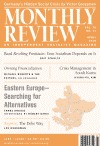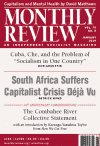Movements

These are uncertain times in Latin America. Popular faith in democracy has been shaken; traditional political parties and institutions are stagnating, and there is a growing right-wing extremism overtaking some governments. Yet, in recent years, autonomous social movements have multiplied and thrived. This book presents voices of these movement protagonists themselves, as they describe the major issues, conflicts, and campaigns for social justice in Latin America today. | more…

In the midst of the U.S.-directed coup attempt against the Bolivarian Republic of Venezuela in January–February, Donald Trump delivered a number of verbal attacks on socialism in Venezuela, Cuba, and Nicaragua. The immediate object was to justify U.S. attempts to overthrow the Bolivarian Republic. The less immediate, but hardly less important, goal was to tarnish the growing social democratic (self-styled democratic socialist) movement in the United States, associated with figures like Bernie Sanders and Alexandria Ocasio-Cortez. In order to safeguard their ambitious social-reform program, the new coterie of Democratic Party socialists have thus sought to separate themselves from Venezuela and other Latin American socialist states, presumably abandoning these countries to their fates at the hands of U.S. imperialism. This raises the historic question of social imperialism—a policy of social reform at home and imperial hegemony abroad. | more…

Germany is commonly perceived as a strong, dependable island amid a sea of gyrating European uncertainties, a down-to-earth, dependable ally in attempts by the better U.S. presidents to move the world forward as steadily as possible. For the past thirteen years, this view has been personified in the clear, undramatic words and deeds of Angela Merkel, Chancellor of Germany since 2005. Considerable doubts in this appraisal, with evidence that Germany, like every other country, has never been a monolith free of class conflict and other contradictions, are addressed in Oliver Nachtwey’s Germany’s Hidden Crisis: Social Decline in the Heart of Europe, out now from Verso Books. In describing West German, then all-German, developments from the end of the Second World War until the present, Nachtwey analyzes from the left, unafraid to utilize the ideas of Karl Marx as well as a host of more recent analysts of many shades. | more…

Why would an American girl-child, born into a good, Irish-Catholic family in the thick of the McCarthy era—a girl who, when she came of age, entered a convent—morph into an atheist, feminist, and Marxist? The answer is in Helena Sheehan’s fascinating account of her journey from her 1940s and 1950s beginnings, into the turbulent 1960s, when the Vietnam War, black power, and women’s liberation rocked her bedrock assumptions and prompted a volley of life-upending questions—questions shared by millions of young people of her generation. But, for Helena Sheehan, the increasingly radicalized answers deepened through the following decades. | more…

To comprehend twenty-first-century imperialism we must go beyond analysis of the nation-state to a systematic investigation of the increasing global reach of multinational corporations or the role of the global labor arbitrage. At issue is the way in which today’s global monopolies in the center of the world economy have captured value generated by labor in the periphery within a process of unequal exchange, thus getting “more labour in exchange for less. The result has been to change the global structure of industrial production while maintaining and often intensifying the global structure of exploitation and value transfer. | more…

From the Gaze of the Supervisor to the Digitalization of Employees
Workplace surveillance and the invasion of employee privacy have always been present under capitalism. Historically, this has mostly involved the combination of visual observation and abstract time, focusing on employee performance. However, the development of new information and communication technologies has brought important changes to the manner in which employers control employee productivity. Such digitalization or datafication of employees constitutes a qualitative change in the history of workplace surveillance—a change that reduces workers, their performance and bodies, to lines of code and flows of data to be scrutinized and manipulated. | more…

In this issue we commemorate the fortieth anniversary of the publishing of the definitive version of The Combahee River Collective Statement in Zillah Eisenstein, ed., Capitalist Patriarchy and the Case for Socialist Feminism. We are also extremely pleased to announce Monthly Review Press author Kohei Saito has won the prestigious Deutscher prize for 2018 for his Karl Marx’s Ecosocialism: Capital, Nature, and the Unfinished Critique of Political Economy. There is no doubt that this book constitutes one of the great works of Marxian theory in our time. | more…
Business tycoon Cyril Ramaphosa, who, according to Forbes, was worth more than $450 million in 2015, has been the president of the ruling African National Congress since December 2017. Despite the change in ruling-party leadership, the residual old-guard politicians from the era of Jacob Zuma’s patrimonial, corrupt regime still retain enormous power. | more…

The presidential elections in Cuba in March 2018 has raised again the question of the country’s survival. How can Cuba hold up and develop against the economic, cultural, and military encirclement of U.S. imperialism in particular and the capitalist system in general? An answer can be sought in the history of Cuba’s socialist transition, the unique role played by Che Guevara, and the emergence of ideas regarding the possibility (and impossibility) of achieving socialism in one country alone. | more…

A World Turned Upside Down? poses two overarching questions for the new period opened by the Trump election and the continued growth of right-wing nationalisms. Is there an unwinding of neoliberal globalization taking place, or will globalization continue to deepen, but still deny the free cross-border movement of labor? | more…

“Mythologies,” writes veteran human rights lawyer Michael Tigar, “are structures of words and images that portray people, institutions, and events in ways that mask an underlying reality.” For instance, the “Justice Department” appears, by its very nature and practice, to appropriate “justice” as the exclusive property of the federal government. In his brilliantly acerbic collection of essays, Tigar reveals, deconstructs, and eviscerates mythologies surrounding the U.S. criminal justice system, racism, free expression, workers’ rights, and international human rights. | more…

One of the horrors of the capitalist system is that slave labor, which was central to the formation and growth of capitalism itself, is still fully able to coexist alongside wage labor. But, as Karl Marx pointed out, it is the fact of being paid for one’s work that validates capitalism as a viable socio-economic structure. Beneath this veil of “free commerce”—where workers are paid only for a portion of their workday, and buyers and sellers in the marketplace face each other as “equals”—lies a foundation of immense inequality. Yet workers have always rebelled. They’ve organized unions, struck, picketed, boycotted, formed political organizations and parties—sometimes they have actually won and improved their lives. In his timely and innovative book, Michael D. Yates asks if the working class can, indeed, change the world. | more…










